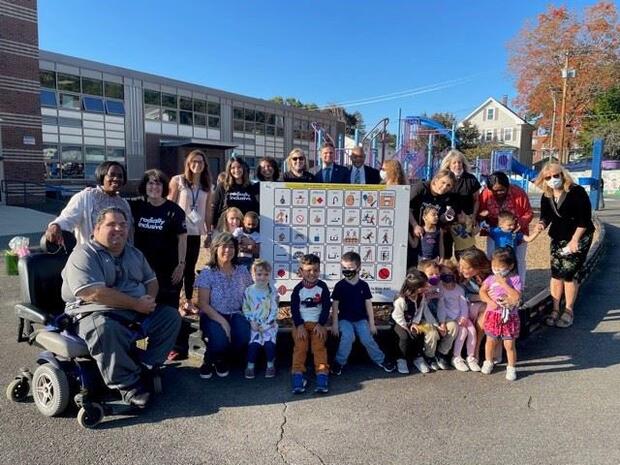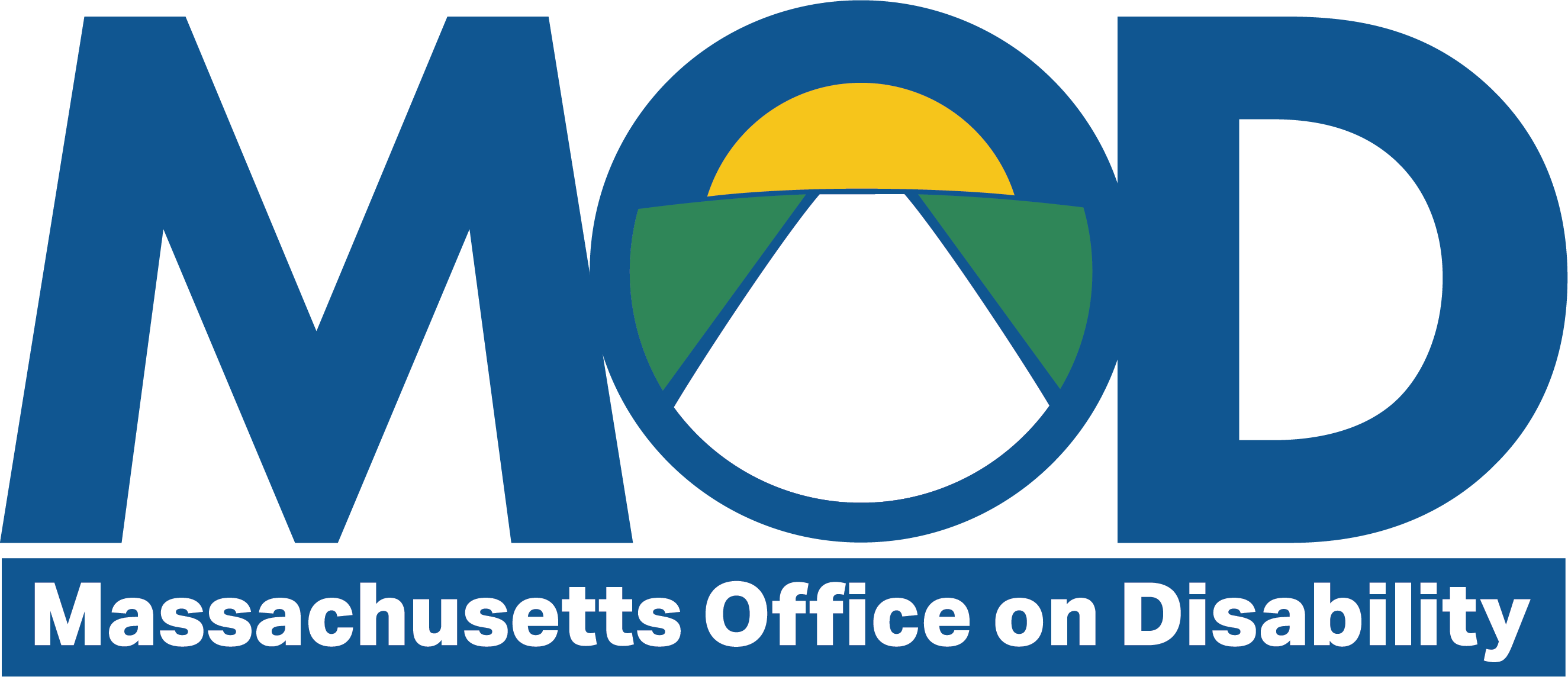- Massachusetts Office on Disability
This post was submitted by the Malden Disability Commission. It has been edited for length and clarity.
The Massachusetts Office on Disability (MOD) provides information and guidance to local Commissions on Disability to help them understand the laws that apply to their establishment and administration. MOD was not involved with this project. To learn more about Commissions on Disability and MOD’s work with them, visit Commissions on Disability.
Imagine being a child on a playground, wanting to join a game, ask for a turn, or express excitement, but not having the speaking words to do so. Imagine carrying a device to help you communicate, only to have others stare in confusion or hesitate to interact because they don’t understand how it works. For many students with communication disabilities, this is a daily challenge.
In Malden, families and advocates recognized the need for inclusive communication access in outdoor play spaces. Thanks to their efforts in partnership with the City of Malden, Augmentative and Alternative Communication (AAC) Boards have been installed on the playgrounds of the Early Learning Center preschool and all five of Malden’s public elementary schools, to provide a visual communication tool that supports all students in expressing themselves, engaging with peers, and fully participating in play.
How the project started
This initiative started with two Malden parents, both experienced special education advocates, who saw a gap in communication accessibility on playgrounds. Their children, both autistic, used AAC in school, but the supports didn’t extend to recess or outdoor activities. The tools were not designed for playground settings. They were easy to lose, could break, or simply weren’t practical for active play.
Determined to create change, these parents partnered with the Malden Disability Commission, the Mayor’s Office, and Malden Public Schools to bring permanent, accessible AAC Boards to school playgrounds. Through collaboration and advocacy, they secured funding and designed boards that would be durable, visually engaging, and familiar to students who use AAC in the classroom.
The advocacy work stated with reaching out to school and City staff to collaborate, educate, and create an Action Plan to apply for funding for the AAC Boards to be placed in the Early Learning Center and the five elementary school playgrounds. From here, the parents presented their idea to the Malden Disability Commission.
The impact of AAC Board access
The icons on the AAC Boards and words are used throughout the school day by specialized staff, including Speech and Language specialists, Special Education teachers, and support staff. These professionals incorporate AAC into lessons, therapy sessions, and classroom activities, helping students develop communication skills in structured settings.
Access to AAC Boards has many positive impacts, including:
- Inclusion: When communication tools are available in shared spaces, it normalizes different ways of communicating and reduces misunderstandings.
- Expanded communication access: Many students already use AAC in the classroom. Having AAC Boards in playgrounds allows them to continue using familiar supports outside, creating consistency and reinforcing skills.
- Peer engagement: AAC is for everyone. These boards provide a way for all children to connect, play, and understand each other, making social interactions more natural and accessible.
- Fostered independence: By giving students access to communication options in outdoor settings, they can express themselves in real time, without needing an adult to interpret for them.
“Watching my 12-year-old son use the AAC Board on the playground, pointing to a symbol to connect with a friend, is something truly beautiful,” shared Imene Bouziane Saidi, Malden Parent and Educational Advocate. “He has been using AAC since preschool, thanks to the incredible support of the Boston Children’s Hospital Autism Language Program and my son’s school Team, and we have always known that he communicates in rich, meaningful ways. For so long, the challenge wasn’t his ability to connect, but rather whether the environment gave him the right tools to do so. As a gestalt language processor, he thrives on communication that is natural, meaningful, and interactive. These boards help bridge that gap, allowing him to engage in play, build friendships, and express himself freely. Playgrounds should be spaces where all kids can share joy, make choices, and be part of the fun, and these boards make that possible.”
Project steps
This project was a collaboration between the City of Malden Mayor’s Office and School Administration, the members of the Disability Commission, and the parent advocates.
If your city or town wants to install AAC Boards, here’s how to get started:
- Collaborate with Schools and Local Officials: Work with school administrators, educators, and city officials to gain support.
- Secure Licensing and Materials: Malden partnered with "Communication is Key", an organization that provides AAC Board templates. Contact Julia Dapkus(communicationiskeyaac@gmail.com) for licensing options.
- Find a Printing and Installation Partner: The boards should be double-sided, made of 4’x5’x6mm aluminum panels with graffiti-resistant lamination, and installed on playgrounds using wooden or aluminum poles. They weigh about 20 pounds each. When choosing a location for installation, prioritize a spot that is fully integrated into the playground rather than placed to the side, such as near a fence. Positioning the board within the main play area encourages organic interactions and makes communication a natural part of play.
- Identify Funding Sources: Malden funded the project through the school budget, but other options include:
- Municipal funds (e.g., city budget for park maintenance)
- Grants, such as the Massachusetts Office on Disability’s Municipal ADA Improvement Grant

